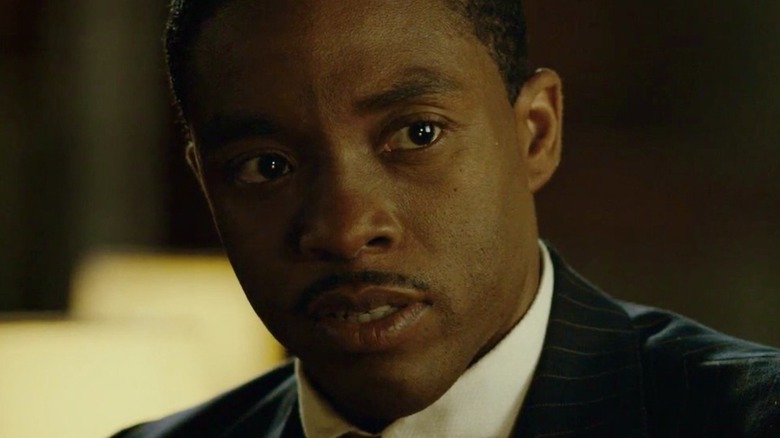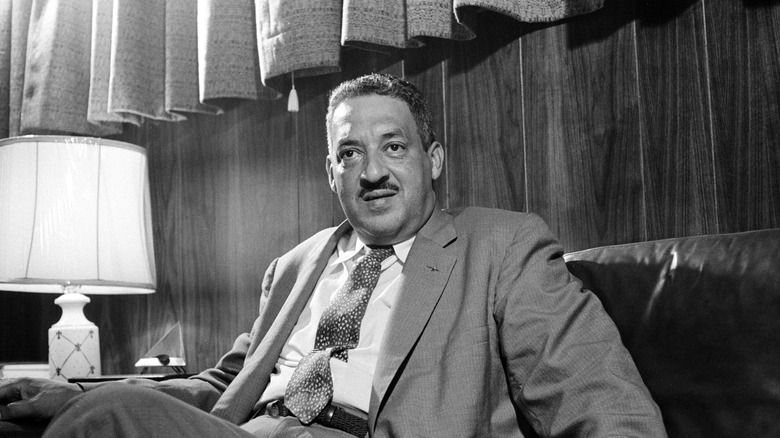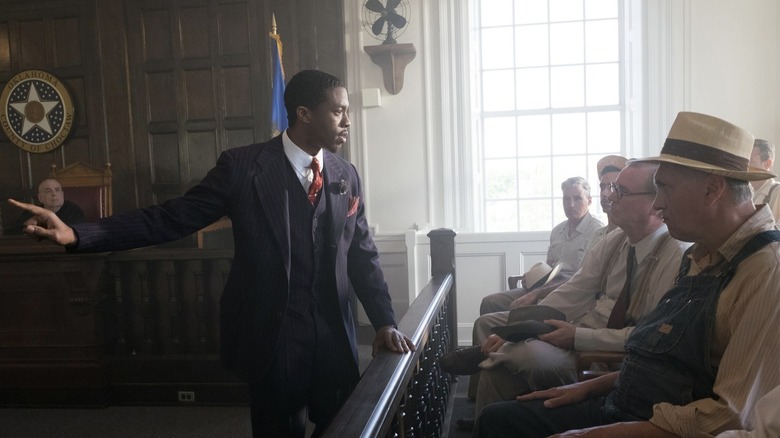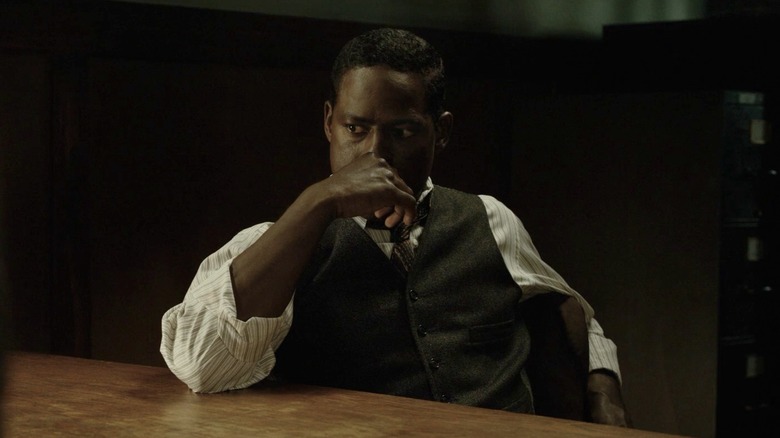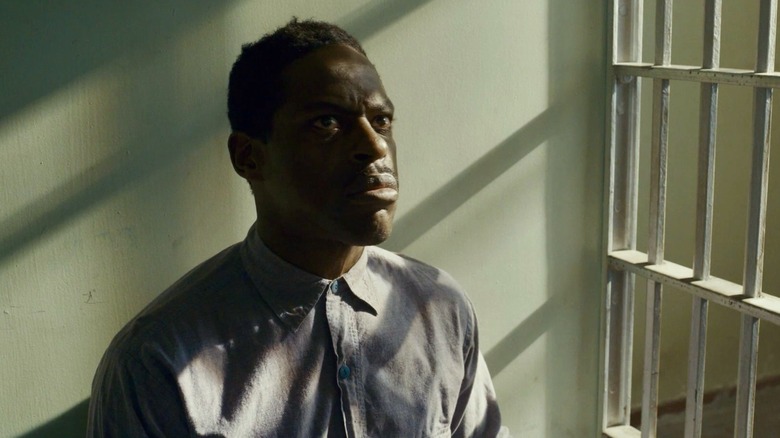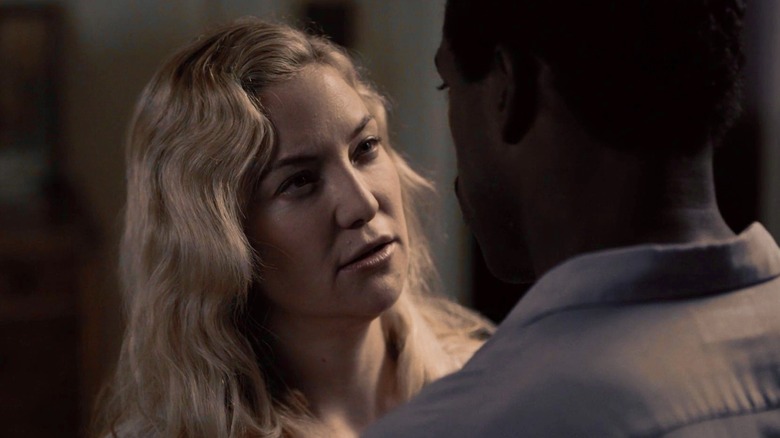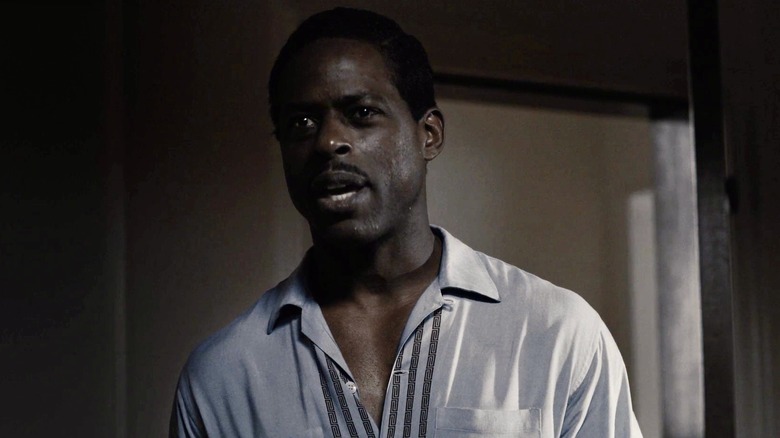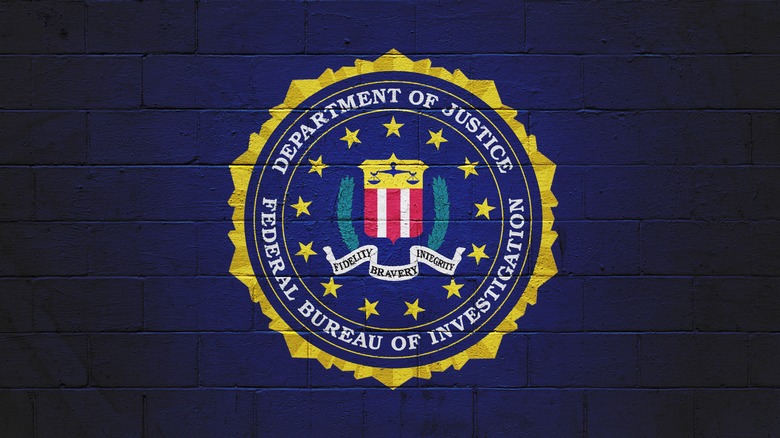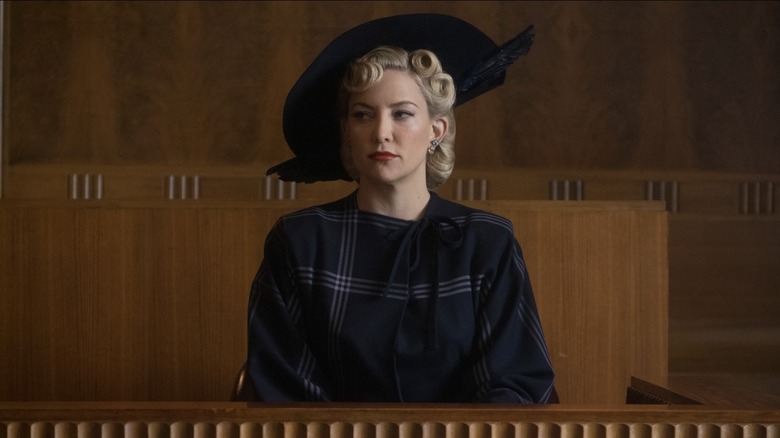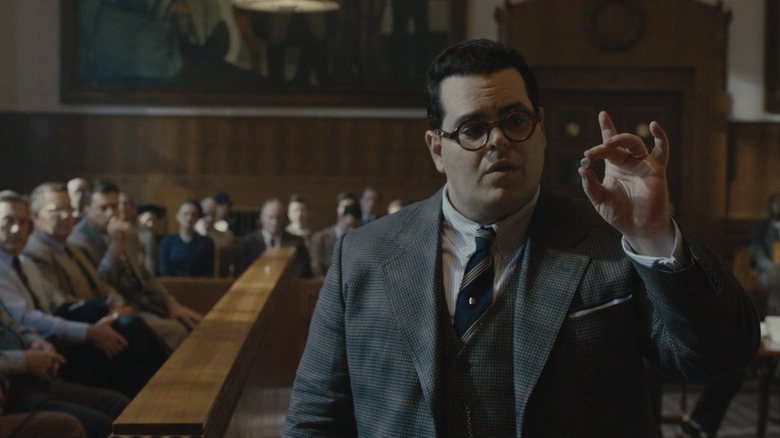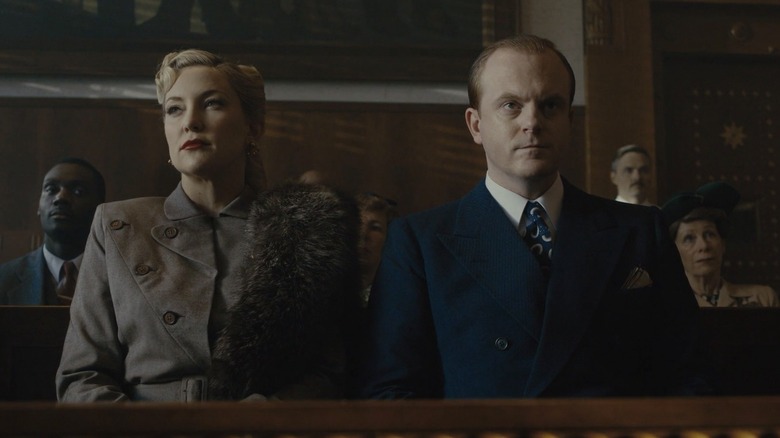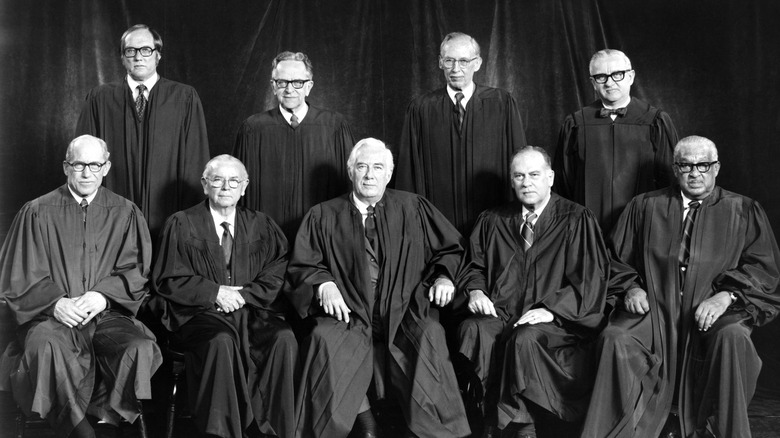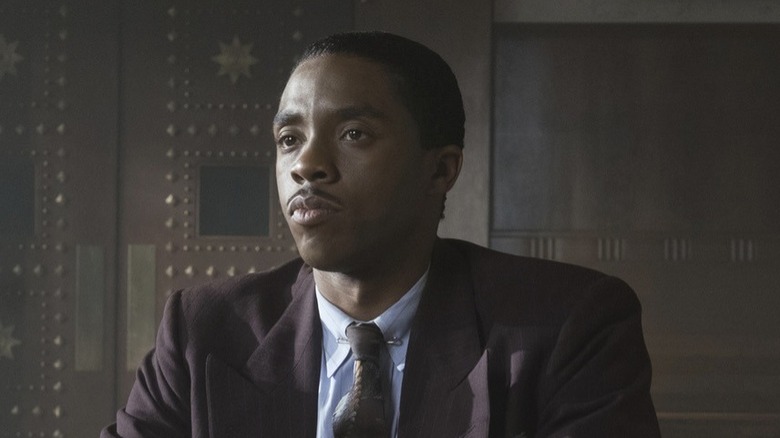Everything Marshall Doesn't Tell You About The True Story
The historical thriller "Marshall" might be named for the first Black Supreme Court Justice, but it isn't a biopic about the civil-rights hero Thurgood Marshall (Chadwick Boseman). Director Reginald Hudlin told Variety, "It's a thriller, not a biopic, about an early case of one of the greatest lawyers in American history." In 1941, Marshall was sent to Greenwich, Connecticut, by the NAACP to represent a Black chauffeur, Joseph Spell (Sterling K. Brown), who was accused of the attempted murder and rape of his boss, a white socialite named Eleanor Strubing (Kate Hudson).
The State of Connecticut v. Joseph Spell might not be Marshall's most famous case, which was the landmark segregation case Brown v. The Board of Education, but Spell's case was representative of the criminal cases Marshall took as a litigator for the NAACP. Their mission was to represent pro bono, innocent Black people who were being persecuted because of their race. Marshall traveled tirelessly around the country to help ensure Black defendants got a fair trial.
Marshall hadn't passed the bar in Connecticut, so the Bridgeport NAACP hired a local lawyer, Sam Friedman (Josh Gad) to induct Marshall, petitioning the court to allow Marshall to represent Spell. Judge Foster (James Cromwell) didn't concede, but compromised, allowing Marshall to consult and sit at the defense table, but barred him from speaking in court. Marshall was the architect of the defense strategy, mentoring Friedman, who specialized in civil insurance law.
Keep reading to learn everything "Marshall" doesn't tell you about the true story.
Thurgood Marshall got his interest in law from his father
Thoroughgood Marshall was born in Baltimore, Maryland, on June 2, 1908. He legally changed the spelling of his name at age six from Thoroughgood to Thurgood, because he was tired of being teased by his friends (per US Courts). Thurgood was raised by his father, William, who was a steward at a local private club, and his mother Norma, who taught kindergarten (via Biography).
William enjoyed watching trials at the local courthouse and would debate the cases with his sons over dinner. According to Biography, Thurgood credited these debates with sparking his interest in law, saying, "Now you want to know how I got involved in law? I don't know. The nearest I can get is that my dad, my brother and I had the most violent arguments you ever heard about anything. I guess we argued five out of seven nights at the dinner table."
These debates led Thurgood to join the debate team in high school, where he discovered he had a talent for oration (per Biography). Thurgood was also known as a prankster, a personality trait we see highlighted in the film "Marshall." As punishment for a prank, the principal made Thurgood read (and he also memorized) the entire U.S. Constitution. Thurgood realized African-Americans did not benefit from the rights the Constitution afforded them. This experience sparked his interest in civil rights, racial justice, and the court system as a teenager, according to US Courts.
Marshall graduated from Howard Law magna cum laude in 1933
After high school, Thurgood Marshall attended Lincoln University, a historically Black college in Pennsylvania. As depicted in the film, Marshall attended college with Langston Hughes, who he remained friends with after college. Marshall also went to school with jazz musician Cab Calloway and the future president of Ghana, Kwame Nkrumah (per Biography).
After graduating in 1930, with honors, Marshall applied to the University of Maryland Law School. As he told Sam Friedman in the film, Marshall was denied admission to Maryland because of his race. Marshall attended Howard University for law school and he graduated magna cum laude in 1933. After graduation, Marshall opened his own law office in Baltimore but landed no clients because of his inexperience. In 1934, he began working with the Baltimore NAACP branch office (via Biography).
As a legal student at Howard University, Marshall met Charles Hamilton Houston, and the vice-dean of the law school mentored Marshall. In 1935, Houston was the director of the NAACP Legal Defense and Education Fund, working closely with Marshall (per US Courts). "In 1936, Marshall moved to New York City to work full time as legal counsel for the NAACP. Over several decades, Marshall argued and won a variety of cases to strike down many forms of legalized racism, helping to inspire the American civil rights movement" (via Biography). This is the period of Marshall's life depicted in the film. Political scientist Peter Dreier called the NAACP's Legal Defense Fund, "the first public interest law firm devoted entirely to identifying cases that would change society, not just help a particular plaintiff."
Spell lived with his common-law wife in the Strubing's attic
In the legal thriller, "Marshall," Joseph Spell is depicted as a man who abandoned his wife and children in Louisiana when he moved to Connecticut. Spell left his first wife in Louisiana to join the army and they never divorced (per Legal Affairs). In 1940, he lived with his common-law wife, Virgis Clark, at the Strubing residence where they both were domestic workers (per Smithsonian Magazine).
Spell's position as a domestic worker was part of the reason the NAACP defended Spell. As reported by Legal Affairs and addressed in the film, after Spell was arrested, Greenwich families began firing their domestic workers. The NAACP was accused — by founding member W. E. B. Du Bois — of ignoring racism in the North, by focusing their legal work in the South.
The NAACP's winter newsletter acknowledged the importance of the Spell case, saying, "the large number of Negro domestics who will be directly affected by this case and will suffer unless we do all in our power to secure justice for Spell," suggesting the threat to domestic workers job security was as important to the NAACP as clearing Spell's name (via Legal Affairs).
After Spell's acquittal, he told Associated Press reporters, "What a relief! I'm going back to my sick mother in Louisiana where I should have been." Despite claims he would move back to Louisiana, according to Legal Affairs, Spell only moved to East Orange, New Jersey, where he lived with his common-law wife until he died in 1968.
The authorities claimed Spell confessed after 16 hours of interrogation
On December 12, 1940, The New York Times reported that assistant prosecutor Archibald H. Tunick announced Joseph Spell had confessed after 16 hours of interrogation. Contrary to what the police and DA claimed, Spell insisted he never confessed to raping Eleanor Strubing, but to having consensual sex with her. According to Legal Affairs, Sam Friedman's initial reaction to this news was disbelief, saying, "I don't think you could find a man on the street that in any way had any sympathy for Spell or that believed that this was consensual, including me."
In the film, Marshall and his co-council only learn Spell and Eleanor Strubing had consensual sex during the trial, probably for dramatic effect. In the film, Spell tells Marshall, "I never touched that woman," and was later chastised for lying in a sworn statement. When Jen (Sophia Bush) tells Marshall at a bar, "Men are men and women are women" it dawned on Marshall that Spell had consensual sex with Strubing.
As a Black man in America, Spell knew how serious these charges were and how unlikely it was anyone would believe his story. At the time of the trial, the African-American newspaper New York Star & Amsterdam News wrote, "It was generally believed that the jury's final verdict would be based on America's unwritten law about white women and colored men. With white men and colored women, however, the unwritten law is usually forgotten" (per Smithsonian Magazine).
Joseph Spell wanted to borrow money for his sick mother
In the film "Marshall" Joseph Spell says he went to Eleanor Strubing's room to borrow money to pay back someone he lost money to while playing cards, suggesting he was an irresponsible gambler who made a string of bad choices in life. In real life, as reported by the Associated Press, Spell denied Strubing's lurid account of rape, kidnapping, and attempted murder. Spell maintained, he went to Mrs. Strubing's room that night to ask to borrow money to send to his sick mother, when he was "led on" by Mrs. Strubing.
It is suggested (in the film) Mrs. Strubing was lonely and sad. Her husband traveled a lot for work and Mrs. Strubing implied her husband beat her when Spell asked how she got a bruise on her arm. These characterizations from the film certainly add to the creditability of consensual sex, by suggesting Mrs. Strubing was unhappy in her marriage. There were no suggestions of domestic abuse in any historical documents we found, although that doesn't seem like something papers would report on in 1941.
According to The Seattle Times, there wasn't a transcript of the court proceedings of the trial available. Michael Koskoff, a trial lawyer from Connecticut who wrote the screenplay with his son Jacob, told Script, "We had some information from Sam Friedman ... We had notes from Thurgood Marshall that he made during the trial and notes from Sam Friedman. The dialogue we wrote." This suggests they may have invented the domestic abuse angle to support Spell's story.
Joseph Spell hadn't been suspected of stealing from his last employer
In the film, Joseph Spell was accused of stealing by his previous employer, but according to Legal Affairs, "The day before he started with the Strubings, Spell had been arrested and had received a suspended sentence for threatening to hurt a former employer unless she gave him a small loan." Extortion isn't technically theft, but it suggests Spell had a history of run-ins with law enforcement, whether he was guilty or innocent of the alleged crimes.
In "Marshall" Spell was dishonorably discharged from the military, and the prosecutor Loren Willis (Dan Stevens) used this against Spell to establish a pattern of questionable behavior during the trial. Willis used these mistakes to convince the jury that they should convict Spell of rape and attempted murder. According to Legal Affairs, this is true. Spell was dishonorably discharged from the Army after six years of service for stealing and wrecking an officer's car while he was drunk.
In the film, Marshall acknowledges all of Spell's character flaws, while recognizing that people who are accused of a crime aren't necessarily "perfect citizens" but that doesn't mean they aren't innocent, nor does it mean they don't deserve expert representation and a fair trial despite their history, mistakes, and flaws. Although the NAACP only represented innocent clients, because of the sixth amendment everyone is guaranteed legal representation in the United States, regardless of guilt or innocence.
The FBI was called in to investigate the alleged kidnapping
As reported by The New York Times on December 12, 1940, agents from the Hartford branch of the FBI were brought in on the case because Eleanor Strubing was allegedly taken across state lines against her will, where she was found near the Kensico Reservoir, one mile from Armonk, New York. According to The New York Times, the FBI agents left Greenwich, unsure if they would invoke The Lindbergh Kidnapping Law with Mrs. Strubing's alleged rape, kidnapping, and attempted murder.
After the Lindbergh baby was kidnapped in March 1932 and transported across state lines, congress passed the Federal Kidnapping Act on June 22, 1932, but it was commonly called The Lindbergh Kidnapping Law. This act made kidnapping someone across state lines a federal crime, which could face the death penalty. Joseph Spell ultimately was not facing the death penalty but was facing a 30-year sentence, suggesting the FBI ultimately did not invoke the Federal Kidnapping Act in The State of Connecticut v. Joseph Spell.
Eleanor Strubing claimed Joseph Spell had her write a ransom note
On December 12, 1940, Eleanor Strubing claimed Joseph Spell forced her to write a ransom note for $5,000, paid in small bills on the night he allegedly raped and abducted her (via The New York Times). According to Mrs. Strubing, Spell changed his mind and tore up the ransom note. Strubing said sometime later he took her to the reservoir, pushed her off the bridge, and threw rocks at her, leaving after he saw her coat floating in the water. This account reported by The New York Times in 1940 is strikingly similar to Strubing's account in the film, but there was no mention of a ransom note in "Marshall."
It seems an odd choice of the scriptwriters and filmmakers to leave out the ransom note; according to Legal Affairs, the ransom note never making it into evidence was actually a salient part of the defense strategy. Sam Friedman cross-examined Mrs. Strubing for two days and she lost her temper on the stand. Other than the elimination of the ransom note and the addition of the skin samples under Mrs. Strubing's nails the doctor testified to in the film, the details of the real-life case are portrayed accurately in the film.
Hate mail was sent to the lawyers, the jury, and the judge during the trial
In the film, both Marshall and Friedman are attacked by groups of men and physically assaulted. This violence did not happen in real life, but both Marshall and Friedman experienced intimidation. In real life, Marshall, Friedman, the judge, and the jury all received hate mail, including death threats and graphic pictures of lynchings during the Spell trial (per Legal Affairs).
As shown in this courtroom drama, there were protesters outside the courthouse hurling insults and carrying posters with mean-spirited slogans. Threats against his life and intimidation tactics were something Marshall had become accustomed to. Every time he traveled to the Jim Crow southern states, he rolled the dice and risked his life. As reported by The Washington Post, five years after the Spell trial, Marshall would nearly be lynched during a race riot in Columbia, Tennessee.
Friedman was not used to having his life threatened because of his work as a lawyer. As depicted in the film, prior to the Spell trial, Friedman had specialized in civil insurance cases that didn't garner press attention. In 2017, when "Marshall" came out, Friedman's daughter Lauren told The Seattle Times her parents left town after the verdict because of death threats. Legal Affairs confirmed Friedman and his wife left town with Friedman saying, "A lot of people were sore. I can't tell you the things they said" (via Legal Affairs).
Unlike in the film, Eleanor Strubing was not present for the verdict
In the film "Marshall" it seems like Eleanor wanted to say something to Spell after the verdict, but her husband rushed her out of the courtroom. In reality, they were not in court for the verdict. According to the Associated Press, the jury deliberated for 13 hours. When the not guilty verdict was read, only Mr. Philip Strubing (Mrs. Strubing's brother-in-law) was present to represent the family. At the time of the trial, The Daily News reported Mrs. Strubing awaited the verdict in her home, "waxing floors, knitting and doing other manual work prescribed by her doctor" (per Legal Affairs).
As shown in the film, Thurgood Marshall had already departed Bridgeport for his next case, the murder trial of William Douglas Lyons, in Oklahoma. Lyons' murder trial was depicted in the film as taking place before the Spell trial, but in reality, Marshall defended Lyons immediately after Joseph Spell. According to Legal Affairs, Marshall secured Lyons a life sentence rather than a death sentence, despite overwhelming evidence of his innocence and the fact Lyons' false confession was coerced through multiple beatings.
Writer Will Haygood told Smithsonian Magazine, "He [Marshall] was the one black lawyer in this country in the modern pre-Civil Rights era who always had the big picture in mind. He would file voting rights cases, employment rights cases, criminal justice cases, housing discrimination cases, and all of these victories became the blueprint for the 1964 Civil Rights Bill and the 1965 Voting Rights Act."
The U.S. Supreme court banned the death penalty in adult rape convictions in 1977
When Thurgood Marshall and Sam Friedman represented Joseph Spell in 1941, men were still being executed for rape convictions. Although the death penalty in rape cases was rare and contingent upon other criteria, the Supreme Court did not ban it until 1977 with Coker v. Georgia, when Marshall himself was a justice on the court. According to JUSTIA, Justice Marshall, "concluded that the death penalty is a cruel and unusual punishment prohibited by the Eighth and Fourteenth Amendments."
According to The Guardian, "Of the 455 men executed for rape between 1930 and 1972, 405 were African American." The consequences of being wrongly convicted for rape were dire. Although Spell was not facing capital punishment, as the film depicted, he was facing 30 years in prison (per Legal Affairs). As Spell said in the film "Marshall," white mobs lynched Black men for being accused of raping white women.
Living in Greenwich, Connecticut, spared Spell from a southern lynch mob, but it did not guarantee him a fair trial or equal treatment by police or prosecution. The statistics stated above, by The Guardian, depict the disproportionate number of Black men who were executed for rape, revealing the inherent racism in the court system that Marshall dedicated his life's work to eradicate.
The casting of Boseman as Thurgood Marshall faced criticism
Some criticized "Marshall" for ignoring how colorism positively affected Thurgood Marshall's life and career, by casting a dark-skinned actor to play the light-skinned historical figure. While others believe this specific story was not about the aspects of Marshall's life and career that were affected by colorism, concluding casting Chadwick Boseman in the role wasn't problematic. Regardless of the criticisms of ignoring colorism, most critics acknowledged Boseman captured Marshall's sense of humor and confidence.
During an interview with Jimmy Fallon, Boseman acknowledged this subject, saying, "I don't look like him in terms of complexion, and you know once I read [the script], I realized that, that really wasn't important ... each movie you do about a real person is a painting, and you choose certain things about a painting that you want to show. For this one, it's the spirit of the man" (per The Hollywood Reporter).
Reginald Hudlin told The Guardian in a phone interview, "The thing about Thurgood Marshall is his whole life is incredible. What intrigued me was this figure of him as a young man — vital, dashing, with this swagger — very different from the mental picture that you may have of him. I think he's one of the most underrated heroes in American history." Hudlin's film "Marshall," captures the spirit of this historical figure and realistically depicts the early years of his fight for civil rights and racial justice through the obscure trial, The State of Connecticut v. Joseph Spell.
